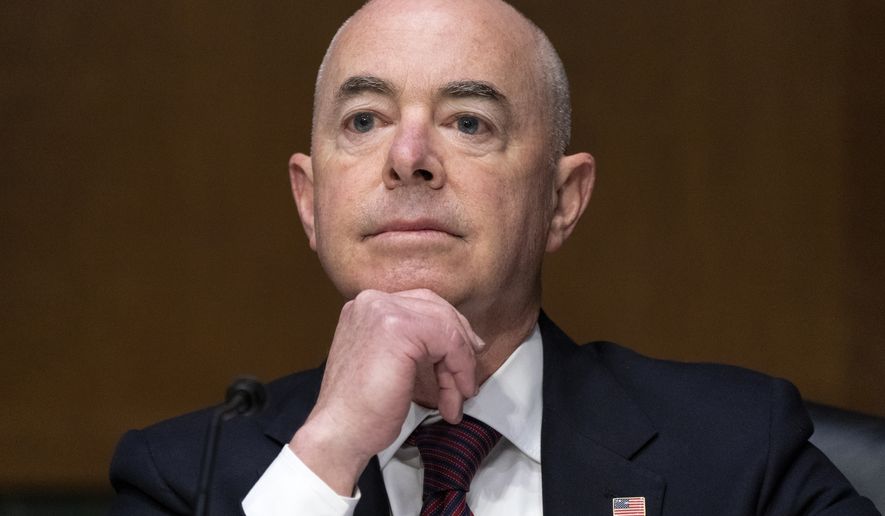The Department of Homeland Security said Wednesday that it has “paused” its disinformation governance board because the botched rollout and “false attacks” on its mission have become too much of a distraction for the board to move ahead right now.
Nina Jankowicz, the embattled director of the board, resigned over what she called “mischaracterizations” of the work she wanted to do.
Still, Homeland Security said it hopes to revive the disinformation effort in some fashion. The department assigned two former senior government officials to lead a review of the department’s work on disinformation. The report is due in 75 days. Until then, “the board will not convene and its work will be paused,” the department said.
Even as they put it on hold, officials defended the purpose of the board and said it was the victim of overblown fears about censorship.
“The board has been grossly and intentionally mischaracterized: it was never about censorship or policing speech in any manner. It was designed to ensure we fulfill our mission to protect the homeland, while protecting core constitutional rights,” the department said in a statement.
Ms. Jankowicz said she won’t be around for the reboot.
SEE ALSO: White House defends Nina Jankowicz after embattled disinformation czar resigns
“I have decided to leave DHS to return to my work in the public sphere,” she said in a statement provided to CNN. “It is deeply disappointing that mischaracterizations of the board became a distraction from the department’s vital work, and indeed, along with recent events globally and nationally, embodies why it is necessary.”
Republicans on Capitol Hill, who dubbed the board the Biden administration’s “Ministry of Truth,” celebrated the news of its temporary demise.
“The suspension of the DHS Disinformation Governance Board is by far the best decision that’s been made when it comes to this Orwellian entity,” said Rep. John Katko of New York, the top Republican on the House Homeland Security Committee, and Rep. Mike Turner of Ohio, the ranking Republican on the Permanent Select Committee on Intelligence. “It was clear it was a political tool to be wielded by the party in control.”
Homeland Security Secretary Alejandro Mayorkas revealed the board during congressional testimony last month while answering a lawmaker’s question about what his department was doing to police election-related disinformation aimed at minority voters.
Mr. Mayorkas said the board would communicate directly with communities, particularly minorities, that his department felt were being misled.
The department quickly issued a statement describing a somewhat different vision. It insisted that the board would help harmonize existing efforts on disinformation and would share best practices internally.
Officials said the board’s first targets were disinformation about Russia’s invasion of Ukraine and information that smuggling cartels use to recruit migrants making the journey to the U.S.
It didn’t help that Ms. Jankowicz, tapped to lead the effort, had a history of controversial remarks about free speech and a penchant for sharing misinformation, including about the now-discredited anti-Trump Steele dossier and about Hunter Biden’s laptop computer.
Mr. Mayorkas called Ms. Jankowicz an “expert” in the field of disinformation but acknowledged he was unaware of her controversial statements before his department appointed her.
Amid fierce pushback, Mr. Mayorkas downgraded the importance of the board. He said it was a “working group” to coordinate activities his department was already doing.
Contrary to fears that it would interfere with free speech, he said, the board was supposed to make sure other department entities weren’t trampling on those rights.
Mr. Mayorkas’ rollout also suffered because of how the department handled its other duties, particularly in the sphere of immigration.
Mr. Katko and Mr. Turner said if Homeland Security can’t manage its current missions, “why would we trust this same department to unilaterally expand its mission and tell the public what is or is not truth?”
“This board was only successful in reinforcing that the Department of Homeland Security’s priorities are severely misplaced,” they said.
Republicans have announced several pieces of legislation that would permanently shutter the board. Their efforts are likely to persist even as the department says it wants a reboot.
Leading the department’s review are former Homeland Security Secretary Michael Chertoff, who served in the George W. Bush administration, and former Deputy Attorney General Jamie Gorelick, who served in the Clinton administration.
They are working through the Homeland Security Advisory Committee, which Mr. Mayorkas cleaned out at the start of his term and reconstituted with his own appointments.
Policing disinformation has become politically fraught in recent years, with all sides claiming censorship for offering controversial views across the ideological spectrum.
Conservatives, in particular, have complained about being ousted from private social media networks for views that contradict the prevailing science on the COVID-19 pandemic or for questioning the results of the 2020 presidential election.
One of Mr. Mayorkas’ examples underscores the difficulty of labeling disinformation.
He said one of the board’s missions was to combat smuggling cartels that use wrong information to entice illegal immigrants to make the trip to the U.S.
Yet his department has been engaged in that fight for years, well before the board was constituted.
Part of the trouble Homeland Security faces is that what the smugglers are peddling is true. Illegal immigrants who jumped the border in April had a better than 50-50 chance of being released into the U.S. even if they were caught.
• Stephen Dinan can be reached at sdinan@washingtontimes.com.




Please read our comment policy before commenting.